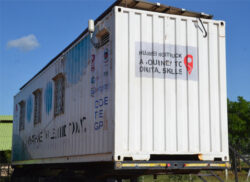
The approval ratings for the government’s Ajira Digital Programme remains high, survey by the Kenya Private Sector Alliance (KEPSA) states. The Programme launched in 2016 aims to link one million Kenyan youth annually to access dignified work through digital platforms over three years.
In a survey conducted by the Kenya Private Sector Alliance (KEPSA) last year more males and older generation approve of programme. The total approval of the programme stands at 79 per cent among respondents surveyed with male accounting 81 per cent while female accounts for 77 per cent. There are more males who are digital workers than females and more youth who are digital workers as compared to those aged 35 and above.
Out of respondents who had mentioned that they had done digital work, the majority mentioned that they had been involved in transcription work at 44 per cent, followed by data entry at 18 per cent and general content writing at 15 per cent. The other types of digital work done in the past months include digital marketing, website design, blogging, scientific content writing, social media campaigns, virtual assistant, graphic design, accounting, coding, online surveys among other tasks.
“A review of the type of worker by population projections shows that there are significantly more digital full time workers than part time workers,”
According to the study, the awareness of the Ajira Digital Programme has increased from 14 per cent in 2019 to 29 per cent in 2021 with the number of workers rising from 3 per cent to 5 per cent. The number of digital workers when projected to the national adult population in Kenya translates to 1,2 million in 2021. The Ajira Digital Project seeks to position Kenya as a choice of labor destination for multinational companies as well as encourage local companies and the public sector to create digital work.
The overall objective of the project is to make Kenya a freelance hub and the global destination for online work by the year 2022.
Phase one of the project provided training to 10,000 youth (8,000 inexperienced online workers with basic soft skills and introduction to online work skills and 2,000 experienced online workers with skills to scale up their business) and; mentorship for the new online workers through hand holding by the experienced online workers thus enabling young people to work online and earn an income with dignity.
The project targets to train youth (inexperienced (new) online workers) through a one week residential training. The training aims to equip the youth with basic soft skills and introduction to online work skills, digital marketing and basic financial management skills across five implementation locations in Kenya namely: Nairobi, Mombasa, Kisumu, Meru and Nakuru.
In addition, the project targets to train experienced online work freelancers through a 2 days training with an aim of equipping the selected online work freelancers with skills to scale up and develop their businesses into agencies and source for more work to share with new online workers. The experienced freelancers are ultimately expected to handhold the new online workers through one month mentorship.
Mentorship
Upon successful completion of the training, the youth are transitioned to one month mentorship through handholding by the experienced freelancers. The mentorship is aimed at enhancing the trained youth’s skills on online work thereby increasing their access to online jobs.
Media Council of Kenya undertakes journalists training. The council is charged with the responsibility of promoting high professional standards amongst journalists in Kenya and therefore conducts specialized and tailor-made trainings for media practitioners in a number of areas. The trainings aim at promoting ethical standards and professionalism among journalists and are conducted both in-house for different media houses as well as in regions. The various categories of journalists trained include: editors, reporters, correspondents, cameramen, photographers, cartoonists, freelancers and bloggers. MCK
Project Achievements
- Curriculum for the training of inexperienced youth on online work and experienced online workers has been developed.
- A total of 7,168 (1,984 female) youth out of the target of 8,000 have undergone training and transitioned to one month mentorship through hand holding by online work freelancers already working and earning from online work.
- 125 experienced online work freelancers have been trained on entrepreneurship and gained skills on scaling up their online businesses

Maryannah Wanjiku says:
J think this is nice as a way of job creation,because most of us are tarmarking with bills to pay and children to raise